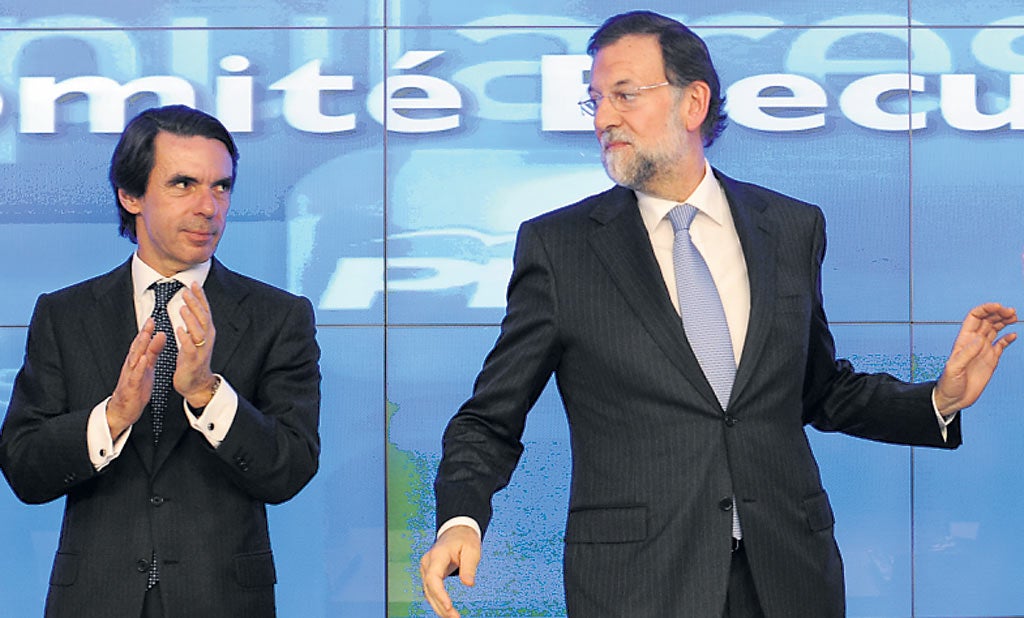Madrid markets fall on return of the centre-right

Your support helps us to tell the story
From reproductive rights to climate change to Big Tech, The Independent is on the ground when the story is developing. Whether it's investigating the financials of Elon Musk's pro-Trump PAC or producing our latest documentary, 'The A Word', which shines a light on the American women fighting for reproductive rights, we know how important it is to parse out the facts from the messaging.
At such a critical moment in US history, we need reporters on the ground. Your donation allows us to keep sending journalists to speak to both sides of the story.
The Independent is trusted by Americans across the entire political spectrum. And unlike many other quality news outlets, we choose not to lock Americans out of our reporting and analysis with paywalls. We believe quality journalism should be available to everyone, paid for by those who can afford it.
Your support makes all the difference.There was no time for Spain's centre-right Partido Popular [PP] to celebrate its general election victory yesterday as markets fell on fears that the party did not have a coherent plan to tackle the country's burgeoning deficit.
Madrid's main stock market fell by 2 per cent in early trading, while 10-year bond yields again approached the worrying 7 per cent level – at which other eurozone countries have needed a bailout. The PP leader Mariano Rajoy, who is set to become the new prime minister, has promised to introduce austerity measures, but has so far provided little detail.
The markets were not assuaged by Mr Rajoy's victory speech, in which he described the Spanish economy as being in "its most delicate situation in 30 years". Soraya Saenz de Santamaría, the PP parliamentary spokeswoman, called for the handover of power from the Socialist Party [PSOE], in power for the past seven years, to be speeded up.
To the dismay of some PP officials, and the markets, Spain's new parliament is not due to meet until 13 December. Mr Rajoy will only be sworn in as prime minister about 10 days later. "There are extraordinary problems which might demand that the interim period between one government and the next did not exist," Ms Saenz de Santamaría said. "The markets do not wait for ministers to be appointed or for parliamentary [chambers] to be formed," added PP president Miguel Arias Cañete.
The Socialists rejected the calls for their speedy departure, however, with the outgoing premier Jose Luis Rodriguez Zapatero saying: "The transfer of power and the timing of it is determined by law." He also pledged to collaborate closely with Mr Rajoy for the month he remains in charge of a caretaker government, but failed to reveal exactly how the two political rivals might ease pressure on Spain's beleaguered economy from the markets.
Spain, the fourth largest eurozone economy, is labouring under a huge public debt pile, and with unemployment nearing 20 per cent, the government's tax revenues are muted. The markets will also be concerned about who will be selected for the crucial finance ministry portfolio, which Mr Rajoy yesterday hinted might be filled by someone from outside the PP.
The uncertainty surrounding who will fill any of the posts in Mr Rajoy's future government is such that the pro-PP newspaper El Mundo held a survey among its readers yesterday entitled "Who will be minister?" alongside photos of 24 possible candidates. Alberto Ruiz-Gallardon, the mayor of Madrid, and Federico Trillo, a former defence minister under former PP premier Jose María Aznar are said to be frontrunners, but Mr Rajoy, well known for his discrete, non-committal style, has yet to indicate any preference.
Defending his record, Mr Zapatero, whose popularity plummeted when he enacted severe austerity measures in 2010, claimed the ferocity of the recession and tension in the markets were to blame for the collapse of PSOE support, concluding, "The whole of Spain knew we had the wind set dead against us".
Join our commenting forum
Join thought-provoking conversations, follow other Independent readers and see their replies
Comments